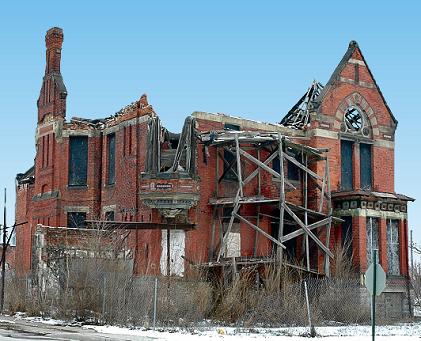Municipal Bond Investors and Detroit's Bankruptcy
Detroit’s bankruptcy filing has investors shaking in their boots. What will happen now that the city is trying to get out of its huge hole of debt? Only time and the court will tell.
Until then, investors are preparing for the possibility of dealing with the shock that their investments in municipal bonds may not be as safe as they believed.
How it All Started
 Detroit has long held the reputation of not having the best government practices. Together with high crime rates, unemployment rates that are twice the national average, and poor schooling (only 7 percent of 8th graders can read well), it’s no wonder the state has ended up in trouble.
Detroit has long held the reputation of not having the best government practices. Together with high crime rates, unemployment rates that are twice the national average, and poor schooling (only 7 percent of 8th graders can read well), it’s no wonder the state has ended up in trouble.
With all of these issues, the city’s population has decreased by 25 percent in the last decade, which has been a contributing factor to the city’s dire financial straits. Tax receipts decreased by 40 percent and state funding by 50 percent since 2002, and even though the city decreased expenses, it wasn’t enough to compensate the lack of funds coming in. Actually, the city has dug itself a hole of debt by $100 million every year since 2008.
Many people are pointing a finger at the government to blame it for the tragic economic catastrophe, but it might not be the cause of it all.
From USA Today:
“City governments don’t equal city economies. It’s possible to have unsustainable city budgets and dysfunctional politics and very exciting regional growth prospects, and all of those trends happening at once,” he [Bruce Katz] is quoted as saying. Katz is co-author of “The Metropolitan Revolution.”
Whether it’s the government or not, there’s one thing for sure: some investors are scared and feverishly trying to save their investments in the $3.7 trillion municipal bond market.
The Bankruptcy’s Effect on the Municipal Bond Market
The market hasn’t collapsed, but no one knows what will happen once the court decides the economic fate of the city. The week of the bankruptcy announcement, worried investors pulled $1.2 billion from municipal bond funds, reports Peter Degroot, JPMorgan analyst, to the Chicago Tribune. It didn’t shake the market too much, however, because prices remained calm, exhibited by the iShares S&P National AMT-Free Muni Bond ETF (NYSE: MUB), which only decreased by .5 percent. It’s down over 7% this year.
Investors may not be reacting as much as anticipated, but they are nervous, especially since their security in municipal bonds has been threatened. For decades, Americans have relied on cities to keep their promise to preserve their investments, despite the stipulation “bondholders remedies may be limited by certain events such as bankruptcy” attached to many bonds.
They found comfort in knowing cities have always tried to negate bankruptcy, so they wouldn’t ruin the confidence investors have in municipal bonds. That’s over for now.
The Best Free Investment You’ll Ever Make
Join Wealth Daily today for FREE. We”ll keep you on top of all the hottest investment ideas before they hit Wall Street. Become a member today, and get our latest free report: “A Maverick’s Guide to Gold: 3 Gold Stocks Set to Disrupt the Market”
It contains full details on something incredibly important that’s unfolding and affecting how gold is classified as an investment..
After getting your report, you’ll begin receiving the Wealth Daily e-Letter, delivered to your inbox daily.
Where to Go from Here
As investors wait for the judge’s decision on the bankruptcy, they are also wondering if there are any safe bonds. Some are considering municipal bonds in services such as sewer and water. These bonds are fueled by the payments homeowners and businesses make for these services, and since everyone needs sewer and water, they seem secure.
The only problem is the possibility of rising foreclosures, which would decrease the need for sewer and water. It seems as though bond security has died with Detroit’s economy.
Bonds may be getting a back seat, but stocks and ETFs may be making a comeback.
-
Coca-Cola (NYSE: KO) has seen increased dividends for 50 years, which is a sign that it has strength in an unstable economy.
-
Procter & Gamble (NYSE: PG) is another resilient stock investors set their eyes on, since it sells products people need such as laundry detergent, toilet paper, diapers, pet products, etc.
-
iShares Dow Jones Select Dividend (NYSEMKT: DVY) has 100 dividend companies in the utilities and consumer industry, which are also essential to the livelihood of Americans.
The risk involved in stocks and ETFs is higher than bonds, but with the recent events in Detroit, what isn’t a risk anymore? Investors could always turn to CDs. With rising interest rates, this may be the best bet for investors seeking low-risk alternatives.
If you liked this article, you may also enjoy:
The Best Free Investment You'll Ever Make
We never spam! View our Privacy Policy
After getting your report, you’ll begin receiving the Wealth Daily e-Letter, delivered to your inbox daily.



